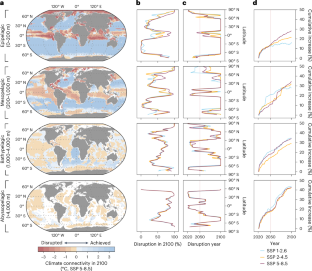气候导致的连通性丧失阻碍了深海物种对变暖的适应
IF 29.6
1区 地球科学
Q1 ENVIRONMENTAL SCIENCES
引用次数: 0
摘要
与陆地生物相比,海洋生物预计会有更少的热屏障限制它们向邻近栖息地移动。然而,目前尚不清楚这种由变暖引起的连通性丧失在不同的海洋地层中如何变化,这限制了变暖对整个海洋生物多样性影响的可预测性。在此基础上,结合热梯度、人类影响和物种容忍阈值,构建了不同气候变化情景下海景层的气候连通性框架。我们表明,变暖可能导致连通性丧失,其程度随着深度的增加而增加。预计到2050年,连通性损失将迅速增加,特别是在深海地层,并可能损害深海门适应变暖的运动能力。随着栖息地范围的压缩,超过四分之一的深海物种居住在可能经历连通性中断的地区,威胁到深海生物多样性的维持。我们的研究结果强调了气候变化通过破坏深海连通性给生物多样性保护带来的挑战。本文章由计算机程序翻译,如有差异,请以英文原文为准。


Climate-driven connectivity loss impedes species adaptation to warming in the deep ocean
Marine life are expected to have fewer thermal barriers restricting their movement to adjacent habitats than terrestrial species do. However, it remains unknown how this warming-induced connectivity loss varies in different ocean strata, limiting the predictability of warming impacts on biodiversity in the whole ocean. Here, we developed a climate connectivity framework across seascape strata under different climate change scenarios, which combines thermal gradient, human impacts and species tolerance thresholds. We show that warming may lead to connectivity loss, with its magnitude increasing with depth. Connectivity loss is projected to increase rapidly in 2050, particularly in deep strata, and may impair the movement capacity of deep-sea phyla in adapting to warming. With the compression of habitat ranges, over one-quarter of deep-sea species inhabit areas that may experience disrupted connectivity, threatening the maintenance of deep-sea biodiversity. Our results highlight the challenges that climate change poses to biodiversity conservation through disruption of deep-sea connectivity. The authors demonstrate that warming will reduce connectivity for ocean species, potentially limiting their capacity to adapt to warming through habitat shifts. The results show particularly strong losses of connectivity in deeper ocean strata, affecting 95% of abyssopelagic species.
求助全文
通过发布文献求助,成功后即可免费获取论文全文。
去求助
来源期刊

Nature Climate Change
ENVIRONMENTAL SCIENCES-METEOROLOGY & ATMOSPHERIC SCIENCES
CiteScore
40.30
自引率
1.60%
发文量
267
审稿时长
4-8 weeks
期刊介绍:
Nature Climate Change is dedicated to addressing the scientific challenge of understanding Earth's changing climate and its societal implications. As a monthly journal, it publishes significant and cutting-edge research on the nature, causes, and impacts of global climate change, as well as its implications for the economy, policy, and the world at large.
The journal publishes original research spanning the natural and social sciences, synthesizing interdisciplinary research to provide a comprehensive understanding of climate change. It upholds the high standards set by all Nature-branded journals, ensuring top-tier original research through a fair and rigorous review process, broad readership access, high standards of copy editing and production, rapid publication, and independence from academic societies and other vested interests.
Nature Climate Change serves as a platform for discussion among experts, publishing opinion, analysis, and review articles. It also features Research Highlights to highlight important developments in the field and original reporting from renowned science journalists in the form of feature articles.
Topics covered in the journal include adaptation, atmospheric science, ecology, economics, energy, impacts and vulnerability, mitigation, oceanography, policy, sociology, and sustainability, among others.
 求助内容:
求助内容: 应助结果提醒方式:
应助结果提醒方式:


